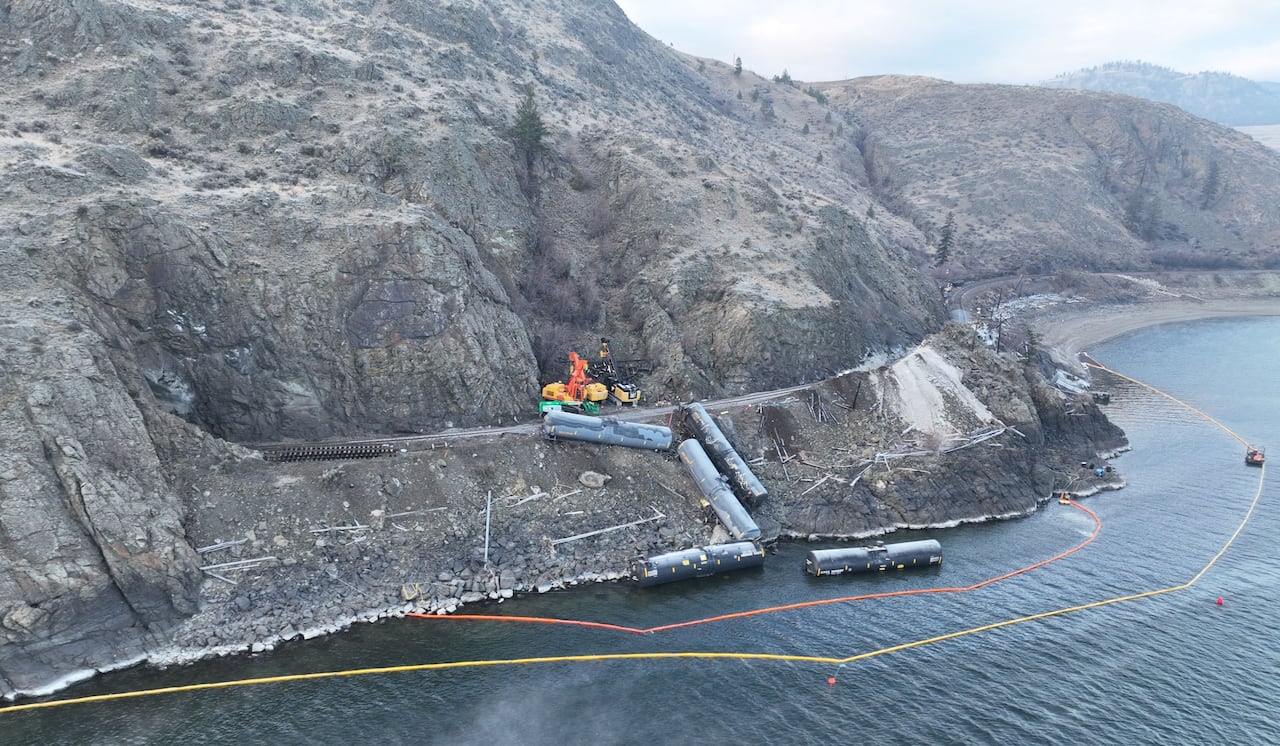Listen to this article
Estimated 5 minutes
The audio version of this article is generated by text-to-speech, a technology based on artificial intelligence.
B.C. officials say that preliminary tests show no contamination above drinking water guidelines after 80,000 litres of fuel was spilled into Kamloops Lake following a train derailment.
The derailment of a Canadian Pacific Kansas City (CPKC) train happened last Saturday, and saw around 80,700 litres of aviation fuel being spilled into the lake after 17 rail cars left the tracks.
Concern immediately grew for multiple communities — like Savona, Tobiano, Walhachin and others — who draw their water supply from the lake, around 240 kilometres northeast of Vancouver in B.C.’s Thompson-Nicola region.
While many communities shut off their water supply from the lake after the spill, officials said Friday that initial tests from water samples showed no direct impact to drinking water in Savona, where 700 residents live, as a result of the spill.
Clean-up work is underway after a train derailed and spilled fuel near Kamloops, B.C.
As the CBC’s Jacqueline Gelineau reports, the Canadian Pacific Kansas City locomotive was carrying fuel and gypsum when it derailed Saturday evening.
“The [Thompson-Nicola Regional District] is still awaiting test results and an update will be provided to customers in Walhachin when these results are known,” read an update from the regional district on Friday afternoon.
“At this time, the risk to the Walhachin Community Water System remains very low.”
The TNRD update comes after test results from all water samples taken earlier this week showed no detections above provincial safety thresholds for drinking water or aquatic life.

Michael Grenier, director for Area J of the TNRD, said in an interview that technical specialists were starting the process of taking jet fuel out of the water on Saturday — as well as removing a train car that was perpendicular to the tracks.
He said that a few dead birds near the lake, including Canada geese, were being sent for necropsies to see if their deaths were related to the fuel spill.

“Kamloops Lake is a scenic environment. It is a major fish run. It’s a wildlife corridor and it’s their home,” he said.
“And so I think it’s really important that … they’re going about this in a methodical way,” he said about the cleanup operation.
The B.C. Environment Ministry said in an update late Friday night that a containment boom is in place on the lake to contain a visible oil sheen.
It added that a surveillance flight did not see any visible oil sheen outside the boom, and the flight operators estimated “there is less than 25 litres of fuel inside the boom containment area.”
“Water sampling is ongoing. CPKC’s lead environmental consultant noted that all samples remain below [B.C.] Source Drinking Water Guidelines,” the update read.

The TNRD noted in its statement that private water operators also drew water from the lake, including in Tobiano, and anyone who is served by a private operator should contact them with any queries.
Bluestem Utilities, the private water supplier in Tobiano, said in a Friday statement that it had shifted to using the water intake only when an operator was present and had completed a thorough inspection.
A spokesperson for the Interior Health authority said Friday that the community of Frederick, across the lake from the spill, has been advised by authorities to not draw water from the lake.
“Currently, Interior Health does not have water testing results from this area to confirm the current risk to human health,” the spokesperson wrote.
“This recommendation is also made proactively to protect private water users in the area, as small amounts of fuel drawn into a water intake may cause long-term damage to a water system.”
Environmental concerns
No one was injured in the derailment, and its cause remains under investigation.
A CPKC statement from said crews have so far removed four rail cars from the lake. The train operator is legally obligated to conduct cleanup operations following the spill.
“Work to safely remove the remaining cars from the site is expected in the coming days,” it said.
Peter Ross, a senior scientist specializing in water pollution at the Raincoast Conservation Foundation, said it was important to continue monitoring the downstream effects of the jet fuel spill over time.
“How many times do we read about, learn about, a spill somewhere in British Columbia?” he asked. “They happen from rail cars, from trucks, from ships, from small vessels.
“These are chronic problems. They’re accidents, by and large, and they are a simple reminder how vulnerable our environment is around here.”







